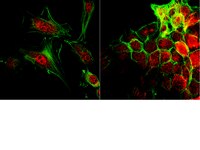Combined modulation of polycomb and trithorax genes rejuvenates β cell replication.
Zhou, JX; Dhawan, S; Fu, H; Snyder, E; Bottino, R; Kundu, S; Kim, SK; Bhushan, A
The Journal of clinical investigation
123
4849-58
2013
Show Abstract
Inadequate functional β cell mass underlies both type 1 and type 2 diabetes. β Cell growth and regeneration also decrease with age through mechanisms that are not fully understood. Age-dependent loss of enhancer of zeste homolog 2 (EZH2) prevents adult β cell replication through derepression of the gene encoding cyclin-dependent kinase inhibitor 2a (INK4a). We investigated whether replenishing EZH2 could reverse the age-dependent increase of Ink4a transcription. We generated an inducible pancreatic β cell-specific Ezh2 transgenic mouse model and showed that transgene expression of Ezh2 was sufficient to increase β cell replication and regeneration in young adult mice. In mice older than 8 months, induction of Ezh2 was unable to repress Ink4a. Older mice had an enrichment of a trithorax group (TrxG) protein complex at the Ink4a locus. Knockdown of TrxG complex components, in conjunction with expression of Ezh2, resulted in Ink4a repression and increased replication of β cells in aged mice. These results indicate that combined modulation of polycomb group proteins, such as EZH2, along with TrxG proteins to repress Ink4a can rejuvenate the replication capacity of aged β cells. This study provides potential therapeutic targets for expansion of adult β cell mass. | 24216481
 |
Polycomb eviction as a new distant enhancer function.
Vernimmen, D; Lynch, MD; De Gobbi, M; Garrick, D; Sharpe, JA; Sloane-Stanley, JA; Smith, AJ; Higgs, DR
Genes & development
25
1583-8
2011
Show Abstract
Remote distal enhancers may be located tens or thousands of kilobases away from their promoters. How they control gene expression is still poorly understood. Here, we analyze the influence of a remote enhancer on the balance between repression (Polycomb-PcG) and activation (Trithorax-TrxG) of a developmentally regulated gene associated with a CpG island. We reveal its essential, nonredundant role in clearing the PcG complex and H3K27me3 from the CpG island. In the absence of the enhancer, the H3K27me3 demethylase (JMJD3) is not recruited to the CpG island. We propose a new role of long-range regulatory elements in removing repressive PcG complexes. | 21828268
 |









